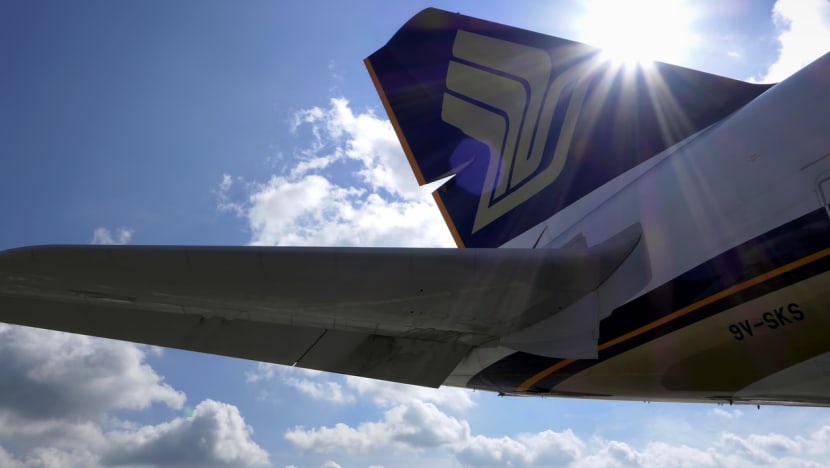SIA, Scoot customers can opt to pay more to reduce carbon footprint through sustainable aviation fuel credits

File photo of a Singapore Airlines plane. (Photo: iStock/olyniteowl)
SINGAPORE: Businesses and travellers can soon choose to pay more for their flights on Singapore Airlines (SIA) and Scoot in order to reduce their carbon footprint, with the launch of sustainable aviation fuel (SAF) credits.
Announcing this on Wednesday (Jun 8), the Civil Aviation Authority of Singapore (CAAS), Singapore Airlines (SIA) and Temasek said the SAF credits will be available in July, allowing businesses to purchase them directly from SIA to reduce carbon emissions from their operations.
As for regular passengers, SAF credits will be made available to them from the fourth quarter of the year through an existing voluntary carbon offset programme, which will allow them to purchase a mix of SAF credits and carbon offsets.
Currently, the programme only offers carbon offsets for travellers, where they can calculate the carbon footprint of their trip and pay a cost to offset this. Their contributions will then go towards verified carbon offset projects across Asia such as rainforest preservation in Indonesia or building solar energy projects in India.
By purchasing the SAF credits, customers could help to stimulate demand and boost the adoption of sustainable aviation fuels, supporting the development of the nascent industry.
As sustainable aviation fuels cost more than conventional jet fuels, credit schemes are a way for airlines to bring down the cost of using more eco-friendly options.
What is sustainable aviation fuel?
Sustainable aviation fuel (SAF) is a form of fuel made from various feedstock or sources, including waste oil and fats, green and municipal waste and non-food crops. It can also be produced synthetically via a process that captures carbon directly from the air.
Such fuel can reduce lifecycle emissions by up to 80 per cent compared to its conventional jet fuel.
For CAAS-SIA-Temasek's pilot, it will use a sustainable fuel made from cooking oil and animal fat, which will then be blended with refined jet fuel at ExxonMobil’s facilities in Singapore.
The use of the sustainable aviation fuel is expected to reduce about 2,500 tonnes of carbon dioxide emissions over one year. At pre-pandemic levels, aviation was responsible for 2-3 per cent of overall global emissions, and current forecasts from the International Air Transport Association (IATA) anticipate significant growth in air travel throughout the 2020s.
However, limited supply and high prices of sustainable fuel are hampering wider adoption.
A gallon of sustainable aviation fuel currently costs about US$8.45 - more than double the average worldwide price of jet fuel, which is around US$4.05 per gallon, according to IATA.
Credit schemes are one way for airlines to bring down the cost of using more eco-friendly fuels.
A total of 1,000 SAF credits will be available for sale, said CAAS, SIA and Temasek in a joint media release.
SIA’s corporate customers and freight forwarders can purchase the SAF credits directly from SIA, mitigating carbon emissions related to their flights.
Meanwhile, freight forwarders can sell the credits to their downstream clients to reduce carbon emissions from their business operations.
The sale of the credits is part of a CAAS-SIA-Temasek pilot announced in November last year to advance the use of sustainable aviation fuel in Singapore.
The one-year trial will see all SIA and Scoot flights flying out of Changi Airport using a blend of refined jet fuel and neat SAF, which refers to sustainable fuels that are unmixed or undiluted, from the third quarter of this year.
The credits will be generated from the 1,000 tonnes of neat SAF and are expected to cut carbon dioxide emissions by 2,500 tonnes.
Every credit purchased will help to reduce 2.5 tonnes of carbon dioxide emissions, according to the media release.
“The launch of the SAF credits provides customers including corporate and individual travellers, and freight forwarders an avenue to do their part for the environment, and reduce their carbon footprint,” it added.
SIA will also partner Climate Impact X to introduce a bundled portfolio consisting of SAF credits and carbon credits.
The product will be designed to meet corporate demand for SAF while balancing affordability, stated the media release.
To ensure transparency, the SAF credits will be registered as part of a pilot project within global membership organisation Roundtable on Sustainable Biomaterials’ booking and claiming system.
During his keynote address at sustainability conference Ecosperity on Wednesday, Singapore Transport Minister Iswaran outlined how the country plans to become a sustainable hub for connectivity.
Besides using eco-friendly fuels, he said Singapore is also looking at the electrification of ground vehicles and harbour craft, as well as other equipment within its seaport and airport.
“Our experience in electrifying motor vehicles, and partnerships with industry players, will yield useful insights in this regard,” he said.
He added that the deployment of new and more efficient aircraft will also significantly reduce fuel burns and emissions.
Citing Boeing, which estimates that every new generation of aircraft is typically 15 t0 25 per cent more efficient, Mr Iswaran said the SIA fleet - which has an average age of about six years - is one of the youngest and most fuel-efficient in the world.

















